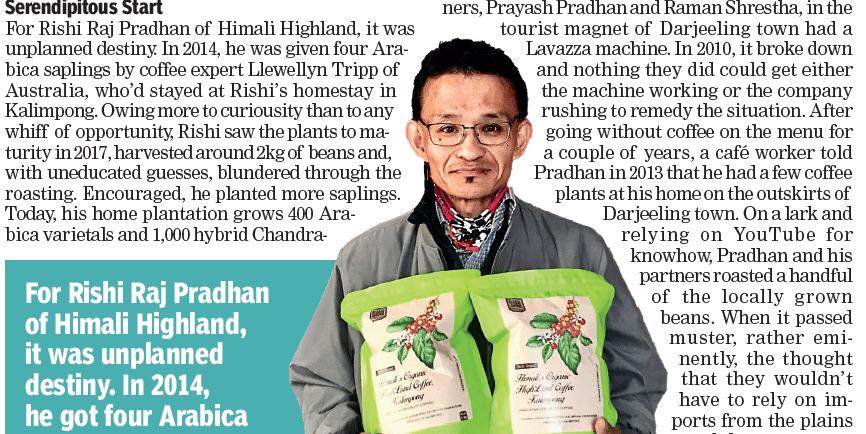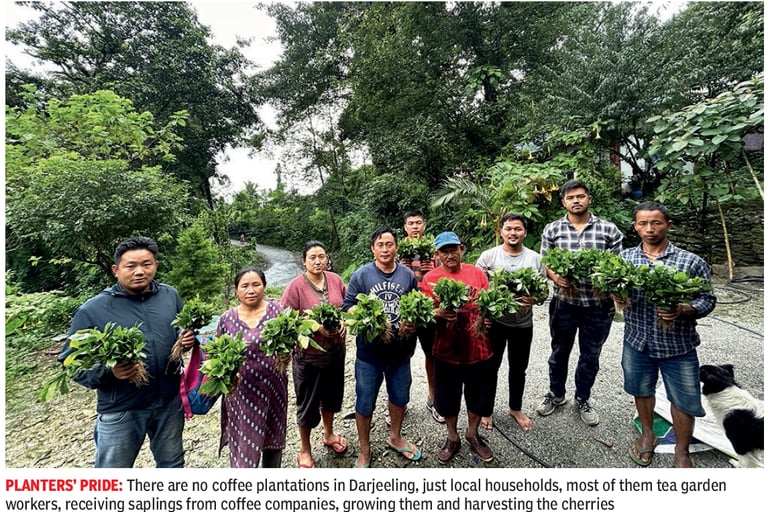Times of India Article: The Rise of North Indian Coffee Producers
Coffee blooms in tea country! Explore the remarkable stories of Darjeeling and Kalimpong farmers pioneering Himalayan coffee cultivation.
7/14/20255 min read


From Tea Gardens to Coffee Farms: The Rise of Himalayan Coffee
North of Darjeeling town, two torrential streams rush down steep slopes to join the Rangeet River, which forms the boundary between Sikkim and West Bengal. Rising from the left bank of the river on the Darjeeling side are the tea gardens of Badamtam, Ging, Singla, and Ba Tukvar, along with the valleys of Rimbu Bustee and Labcha Bustee. The distinctive landscape of tea plantations is broken by unpruned bushes with dark green, waxy leaves and undulating edges, decorated with deep red berries at certain times of the year.
Mention Darjeeling, and you might think of the volatile oils of tea plants that serenade your olfactory nerves and waltz with your taste buds. But now it's time to wake up and smell the coffee – literally. Coffee plants are creating rustic patches that interrupt the tranquil tea gardens.
Today, the hills of Darjeeling, Kurseong, Mirik, and Kalimpong are dotted with these coffee clusters. It's ironic that Darjeeling, synonymous with tea since the 1860s – tea that satisfies the soul, commands premium prices, and makes mouths water when served to special guests – is now also home to this interloper. This new beverage has body like tea and mountain-fresh acidity like tea, yet differs from the Chinese pot like a French press. The only debate might be which drink produces more vibrant aromas.
Late Bloomers
Take a sip. Coffee from the land of tea is slowly but surely making itself heard and tasted. Just about ten years ago, some people casually discovered seeds being planted and cherries ripening to produce beans. Now, local coffee is being sold in cafes, souvenir shops, and e-commerce sites alongside tea bags in these regional tourism hubs.
Umesh Gurung, a barista and certified coffee roaster and quality manager with the Coffee Board of India, serves his Himalayan Cornerstone Coffee directly through Amazon and Flipkart, as well as at his Andante Café in Siliguri, which opened in 2019. Sanjog Dutta, owner of Daammee.com, which sells regional specialties, regularly ships hill coffee to customers across the country. Darjeeling's Altura Coffee, like Kalimpong's Himali Highland Coffee, has grown from relatively small cafes to larger operations.
Hill coffee is still produced in small quantities – about 10.5 tons compared to India's 34,000 tons of beans produced mainly in the south. Like foam and lattes, this adventure in tea land comes down to teamwork between farmers and processors/roasters. Coffee is grown by farmer collectives on micro-holdings, often within traditional tea garden homes. They lack the means or expertise to process the cherries they grow. This crucial task is left to entrepreneurs who, despite lacking investment, have made a good start.
Gurung had his eureka moment during a 2014 trip to the Nepal border, where he saw coffee being produced in the neighboring country. With nearly identical geography, he wondered why he shouldn't experiment with the popular beverage at home. Ten years after that realization, Himalayan Cornerstone produced 6,500 kg of quality coffee this year. Through Korean coffee expert Seo Young-kyu's introduction, he gained much-needed expertise in processing and roasting.
An Accidental Beginning
For Himali Highland's Rishi Raj Pradhan, it was an unplanned destiny. In 2014, he received four Arabica saplings as a gift from Australian coffee expert Llewellyn Tripp, who had stayed at Rishi's homestay in Kalimpong. More out of curiosity than calculation, Rishi harvested about 2 kg of beans when the plants matured in 2017, making mistakes in the roasting process through uneducated guesswork. Encouraged, he planted more saplings. Currently, his farm grows 400 Arabica varieties and 1,000 hybrid Chandragiri plants. This year he produced 650 kg of coffee. Remarkably, aside from Tripp's regular advice, Rishi's journey has been largely empirical, with all his knowledge acquired through internet research, literature reading, and conversations with experts.
Altura's Bikash Pradhan had more compelling reasons for his coffee venture. The café he established with two partners – Prayash Pradhan and Raman Shrestha – at a tourist spot in Darjeeling town had a Lavazza machine. In 2010, it broke down, and it was impossible for the machine to work or for the company to rush to resolve the situation. After years of being unable to serve coffee on the menu, a café employee told Pradhan in 2013 that there were several coffee plants at his home on the outskirts of Darjeeling town. Taking their cue from YouTube tutorials, Pradhan and his partners roasted some locally grown beans. When the coffee took off, the group was encouraged to try producing their own coffee rather than depending on imports from the plains.
Even coffee farmers picked beans for reasons other than the coffee itself. Sunil Subba, who leads the Darjeeling Coffee Committee overseeing the efforts of about 70 coffee-growing households, says, "I'm actually involved in the welfare of poor tea garden workers, especially in education and health. In recent years, with ailing tea gardens and frequent failures of cash crops like oranges and cardamom, I was looking for ways for affected families to supplement their income. Coffee came at the right moment."
Learning to Grow
In Kalimpong, where the local Gorkhaland Territorial Administration envisioned coffee to replace aging cinchona and utilize the vast reserves and quinine factory infrastructure in Mungpoo, coffee growers faced a baptism by fire. The GTA distributed saplings in 2019 in collaboration with the Bengal Horticulture Department and the Directorate of Cinchona and Other Medicinal Plants, but enthusiastic farmers discovered that the saplings couldn't withstand frost. They lost a significant portion of their saplings. Starting from scratch, they now have better footing with private processors and roasters purchasing their cherries.
Arjun Rai, lead farmer at Detailed Bustee, says his group brought in 1,100 kg of parchment – coffee fruit with the fleshy outer layer removed. Parchment requires further layer removal before extracting the two beans for roasting.
Lack of funding has been an issue, but both companies have weathered the storm skillfully. Altura's Pradhan says, "While large companies elsewhere are solving capital and investment issues, we're trying to find innovative solutions within our means." He talks about how he overcame the problem of varying ambient temperatures in Darjeeling between November and April affecting fermentation and creating different flavors in batches even with the same fermentation period. "Large companies have climate-controlled rooms and vats. All of this is beyond our capabilities. But we've devised our own system that doesn't cost much and allows for uniform fermentation," he says.
So are coffee connoisseurs from teapot enthusiasts equally impressed? "Samples sent nationwide and overseas have received rave reviews," says Gurung. Dutta from Daammee says, "Because production scale isn't large, related costs are steep. This might be one reason why the excellent quality Arabica is slowly gaining ground."
Bikash Pradhan says about the future that coffee can become either a commodity or specialty product – the former being low-margin, high-volume like southern India, but with high quality. "Coffee quality is measured by cupping scores, with 80 and above considered specialty," Pradhan says. "This model requires intensive measures and monitoring from variety selection to land, cultivation, processing, and roasting. We plan to have at least one cupping champion within the next 3-4 years."
"Arabica coffee as a crop loves altitude, but overnight frost can devastate a farm. Through some research, we've found that the latitude we're in provides unique growing conditions. So for now, I think we should start labeling local coffee as 'latitude' rather than 'altitude.'"
Add attitude to that. Can't you hear Gurung, Bikash Pradhan, Rishi Pradhan, Dutta, Subba, Rai, and all the farmers smiling and saying, "There, did we get it all done?"


Himalayan Bloom Coffee
Connecting coffee lovers with Himalayan farmers worldwide.
© 2024. All rights reserved.
